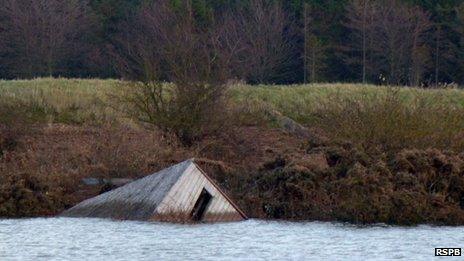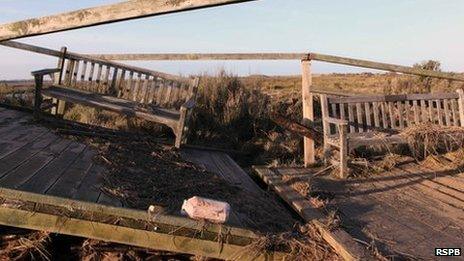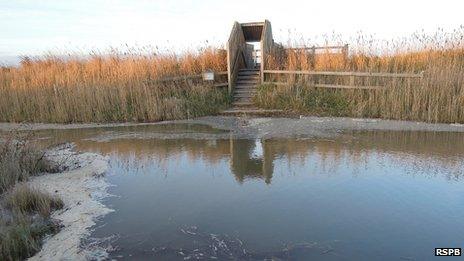Norfolk floods: Surge's impact on wildlife assessed
- Published
The RSPB is going to launch a nationwide appeal to raise money to repair its damaged reserves
Experts have been assessing the damage to wildlife and habitats, following the biggest tidal surge to hit the Norfolk and Suffolk coasts for 60 years.
The RSPB said nature reserves had been affected by the flood water in varying degrees.
There was significant damage at the Snettisham reserve in Norfolk, and the island of Havergate in Suffolk was now vulnerable to high tides.
Damage includes salt water flooding fresh water habitats.
Hide 'disappeared'
At Snettisham, access roads have been completely flooded and badly damaged.
The shingle bank was breached and the lagoons that wintering birds use are full of seawater.
Warden of the reserve Paul Eele, said: "We used to have four hides where people could watch the wading birds roosting.
"After Friday night, we've now only got one hide.
"Two hides have been damaged beyond repair and one has disappeared completely."
Erica Auger from the RSPB said the reserve would be closed for the foreseeable future.
The reserve at Titchwell did not suffer any significant damage, thanks to a project that had been completed to protect the reserve from coastal flooding.
However, the dunes that separated the reserve from the beach were completely flattened, Ms Auger said.
The sea walls have also been breached and sea water has flooded onto fresh water sites.
.jpg)
The Suffolk Wildlife Trust said the waters were receding but leaving behind mud and debris
Bittern affected
"We have a sea of dead worms on some of our fresh water habitats," said Ms Auger.
"We're concerned that we'll feel the effects, come the breeding season in the spring and summer."
The Suffolk Wildlife Trust said the water was receding on their reserves, leaving mud and debris behind.
Project manager Penny Hemphill said "The sudden impact of floods may have resulted in high mortality of small mammals, such as the water vole.
"Also, the inundation of freshwater by saline will result in fish kills which again will affect wildlife who depend on them for food, like bittern."
The Norfolk Wildlife Trust reserve of Cley Marshes, significant for its mix of fresh and salt water marsh, was flooded up to and including the coast road.

The reserve at Snettisham suffered significant damage, with three hides lost

Titchwell RSPB reserve did not suffer too much damage thanks to a completed flooding project

The beach and sand dunes were damaged at the RSPB reserve at Minsmere, but a secondary sea defence remained intact
- Published9 December 2013
- Published9 December 2013
- Published9 December 2013